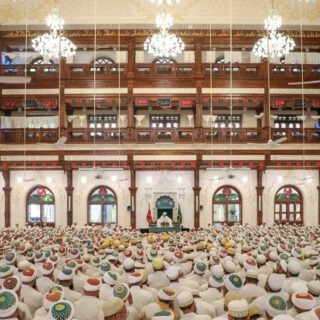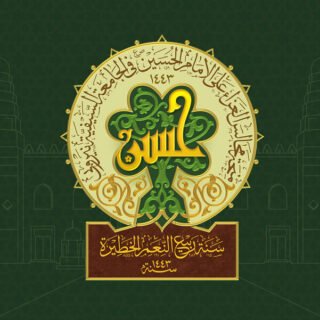Reflections
الفِكرةُ مِرْآةٌ صَافِيَةٌ (al-fikrat mirʾāt ṣāfiyya): ‘contemplation is a clear mirror’, the analogy employed in this kalām mubārak of Amirul Mumineen, Maulana Ali b. Abi Talib AS, shows the importance of contemplation in enabling one to perceive reality. More so, it reveals the significance of light in allowing an individual to see things as they are. It is due to the rays of divine radiance that we are able to insightfully perceive the world around us and then actively contribute to the invention and development of means that lead to the betterment of both the temporal and spiritual realm.
Throughout the ages, Khamsat Athar, Aimmat Tahirin and Duat Mutlaqin AS reveal themselves as the divine light – a light that irradiates the sun, the moon and the stars; thus guiding humanity. This effulgence is not only in their directives and guidance but emanates from their very beings. While describing the resplendence of Maulatona Fatema AS, who is also known as al-Zahra (the radiant), a Mumina narrated, ‘we would be in the presence of Maulatona Fatema AS at night, and some of us would be stitching. Whenever someone sought to thread a needle, they would do so by bringing it near to Maulatona Fatema AS and by her radiance they would be able to pass the thread through the needle’s eye.’ Their clarity of thought made them aware that in all instances, Maulatona Fatema’s AS radiance and conduct would guide them. Likewise, their radiance is such that the natural world remains in their services. Once, when Imam Hasan AS and Imam Husain AS left Rasul Allah’s SA home after dark, lightning illuminated their path home.
Syedna Aali Qadr Mufaddal Saifuddin TUS elaborated on the meaning of contemplation being a clear mirror by showing how a person’s thoughts, like a mirror, reflect who they are. He told us that the Arabic word for ‘mirror’, مِرْآةٌ (mirʾāt), and the Arabic for ‘woman’, مَرأة (maraʾt), are homonyms. He narrated the contrasting thoughts of two women, both consorts of the Prophet Mohammed SA that were reflected through their words and deeds. The first of the two was asked about the meaning of the Quranic aayat sharifa known as the Verse of Purity, the Aayat al-Tathīr. Even though she was well aware of its circumstances, she deflected, telling the questioner to ask Maulatona Umme Salama RA instead. When he came to her, she very precisely and comprehensively narrated how, when the verse was revealed, Rasul Allah SA called for his Ahle Bayt, specifically naming Maulana Ali, Maulatona Fatema and Imam Hasan and Husain AS. He then took a shroud, the Kisāʾ al-Tathīr, Shroud of Purity, and cloaked them, hence the term Khamsat Athar AS (the pure five). Maulatona Umme Salama RA could have limited her account to this and it would have been an authentic narration but such was her scrupulousness that she also narrated the part in which she asked Rasul Allah SA to be included amongst them and was told, ‘this honour is exclusively for those who are from me and I from them’.
Syedna al-Dai al-Ajal TUS elaborated that many would omit a narration of events that might affect their prestige. However, Maulatona Umme Salama’s RA purity and clarity of thought compelled her to give every last detail, hiding nothing, and this was rewarded when Rasul Allah SA confided to her the prophecy of Imam Husain’s AS shahādat. She had come upon him as he wept when the revelation was made to him and the vessel of Karbala’s earth given to him. This he entrusted to her and said when this sand turns red, then know that Imam Husain AS has been slain. Rasul Allah AS knew that, like the narration of Kisāʾ al-Tathīr, Maulatona Umme Salama RA would faithfully convey the tragedy that had befallen the Ahle Bait AS on the plains of Karbala.
This same purity of thought is that which, through the Aimmat Taherin AS, has reached the Duat Mutlaqeen AS, the respected sons of the noble woman, Maulatona Hurrah al-Malika RA, she of crystalline purity and ikhlāṣ. ِFirst among them was Syedna Zoeb RA who remained humble, like Mount Tur, as others around him exhibited presumption, and thus the rank of iṭlāq was conferred upon him. Amongst them, the 51st Dai was like a zujāja, glass [lamp], his glories luminous and clear to all and within this glass, like a kaukab durri, shining star, was the radiance of the 52nd Dai, Syedna Mohammed Burhanuddin RA.
Syedna Mufaddal Saifuddin TUS then touched upon the practical and technological usages of glass. He mentioned how entire buildings are made of glass, and that the advantage of glass is that it allows one to see all that is outside, while shielding him from the elements. In national parks, lions come right up to our cars, yet the windows of our vehicles allow us to observe them closely while protecting us as well.
Syedna al-Dai al-Ajal TUS then mentioned that our bonds of friendship and fraternity should also be unbreakable. He recited the following verse of Syedna Taher Saifuddin RA:
Your bonds of friendship should always remain strong and steadfast; unlike fragile glass, whose breaking is constantly feared.
He then stated that if the bonds between friends are to be so strong then what of those with our true friends: Awliyaa Allah AS? Everything else may shatter but never our moḥabbat.
Syedna TUS then recalled that during the early years of his tenure, Syedna Burhanuddin RA visited Panchgani. Syedna Mufaddal Saifuddin TUS had gone on ahead to oversee the preparations for his arrival and the furnishings of the bungalow that had been rented. He remembered instructing a Mumin from Pune, a glass trader, to install a glass pane, so that Syedna Burhanuddin RA would be able to take in the view and the wind would be prevented from coming in. Syedna TUS also directed him to take proper care of the glass once the visit was over and to make a note that Syedna Mohammed Burhanuddin RA had made use of this glass.
Today, one can ascend skyscrapers of a hundred storeys or more but upon reaching the top and looking down one may become afraid, even dizzy. However, once a Mumin ascends to the heavens and from there is able to observe the entire world below, he will feel nothing but comfort and peace. On the eve of Aashuraʾ, Imam Husain AS revealed to his Ahle Bayt AS and As-haab AS all that would take place the following day. Yet, not one of them felt any fear, instead their conduct on Aashuraʾ revealed the clarity of their thoughts. Despite losing both arms, Maulana Abbas Alamdar RA remained determined to ensure that water reached the haram. Maulana Aliakbar AS refused the sanctuary offered by the adversaries, and when the pangs of thirst overcame him he came before Imam Husain AS. Syedna TUS then recalled the hadith mubārak of Rasul Allah SA: المؤمن مِرْآةٌ المؤمن (al-Mumin mirʾāt al-Mumin), ‘a Mumin is a Mumin’s mirror’, and then mentioned that during his moments, Maulana Aliakbar AS revealed to all Mumineen the unsurpassed happiness and delight of beholding Awliyaa Allah AS during our final moments in this world. This clarity of thought was also displayed by Imam Husain’s AS faithful steed who refused to take even a sip of water knowing that his Maula had been denied water for three days. Likewise, the Duat Mutlaqeen AS too possess such clarity in their thoughts and deeds. They always seek to attain the happiness of their Maula, while striving to ensure that not a single Mumin is denied salvation. Such is the compassion of the Fatimi Duat Mutlaqeen AS.
Following her marriage to Rasul Allah SA, the women of Quraish severed all ties with Maulatona Khadija RA. They would not associate with her nor let anyone else do so, due to which Maulatona Khadija RA felt lonely. During the months she was carrying her, Maulatona Fatema AS would converse with her from the womb, comfort her and offer her solace. As the time of her birth drew near, Maulatona Khadija RA once again reached out to the women of Quraish to assist in the delivery however, as before they outright refused to help, stating that she had married the ‘orphan of Abu Talib’, ‘a pauper’. At the time of birth, four noble women came to her assistance, their radiance was such as if they were from Banu Hashim: Maulatona Sarra, Maulatona Aasiyaa, Maulatona Mariam bt. Imran and Maulatona Kulthum, the sister of Moosa Nabi AS, accompanied by 10 Ḥoor al-ʿEen.
Syedna al-Dai al-Ajal TUS made it clear that this world is not our home, our true home is the hereafter. Our efforts for the betterment of the hereafter should be greater than the efforts we expend for the betterment of this temporal world. Rasul Allah AS has taught us everything, big and small. Prior to Mabath, Rasul Allah AS journeyed to Shām. There, upon witnessing his glories, Buhairā al-Rāhib took him by his hand and led him to his monastery. When he offered Rasul Allah AS a meal he observed how he folded his sleeve, recited bismillah, ate using all five fingers, took only small morsels and licked his fingers clean. After he finished his meal, Buhairā asked Rasul Allah AS, my master, what is your drink? To which Nabi Mohammed AS replied, ‘milk’.
Hudat Kiram AS display the same clarity of thought in all their deeds and actions. Maulana Jabir’s AS pure intent in hosting the ziyāfat of Rasul Allah AS was seen in the life-bestowing blessings he received. Likewise, Maulaya Adam’s AS sincerity of purpose in immediately complying with the Dai’s directives is evident in the veneration given to him by Duat Mutlaqeen AS when coming for his ziyārat.
As he counseled the community to further their businesses, Syedna al-Dai al-Ajal TUS pointed out that for centuries trade and commerce has been in our blood, we do not need to learn it. He then added that whichever task one takes up he should completely focus on it. When at work, one’s mind should be focused on work, when one comes to the masjid for ʿibādat, then he should concentrate on his ʿibādat. One should also make a habit of penning down the tasks at hand, and then carrying them out at the appropriate time. Pleasure and happiness is derived by busying ourselves with our work, frittering time away only yields a false sense of pleasure. He directed Mumineen to regularly offer ṣadaqa, and while travelling, if they ever realize that an accident is imminent, to call out ‘Ya Ali’!
In the later part of the wʿaz mubarak, Syedna Mufaddal
Saifuddin TUS commented, ‘you are all listening so attentively, that I want to continue to do bayan’. May Allah Taʿālā grant us opportunity after opportunity to listen to the words of our
Maula TUS and the purity of thought to assimilate them in our lives and actions, and in turn be blessed by further words of guidance and enlightenment. May Allah grace Syedna Mufaddal
Saifuddin TUS with a long, healthy and prosperous life.
– www.jameasaifiyah.edu









